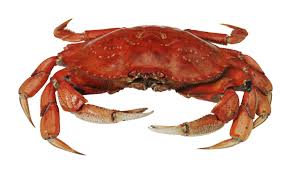crab
英 [kræb]
美 [kræb]
- n. 螃蟹;蟹肉;脾气乖戾的人;起重机
- vt. 抱怨;破坏;使偏航
- vi. 捕蟹;发牢骚;抱怨
CET6+ TEM4 GRE 考 研 TOEFL CET6
crab 螃蟹来自PIE*gerbh, 刮,刻,词源同carve.
- crab
- crab: Crab the crustacean [OE] and crab the apple [14] may be two distinct words. The word for the sea creature has several continental relatives (such as German krebs and Dutch krabbe) which show it to have been of Germanic origin, and some of them, such as Old Norse krafla ‘scratch’ and Old High German krapho ‘hook’, suggest that the crab may have received its name on account of its claws.
The origins of crab the fruit are not so clear. Some would claim that it is simply a metaphorical extension of the animal crab, from a perceived connection between the proverbial perversity or cantankerousness of the crustacean (compare crabbed) and the sourness of the apple, but others have proposed a connection with Swedish dialect skrabba ‘wild apple’, noting that a form scrab was current in Scottish English from at least the 16th century.
=> crayfish - crab (n.1)
- crustacean, Old English crabba, from a general Germanic root (compare Dutch krab, Old High German krebiz, German Krabbe, Old Norse krabbi "crab"), related to Low German krabben, Dutch krabelen "to scratch, claw," from PIE root *gerbh- "to scratch, carve" (see carve). The constellation name is attested in English from c. 1000; the Crab Nebula (1840), however, is in Taurus, the result of the supernova of 1054, and is so called for its shape. French crabe (13c.) is from Germanic, probably Old Norse.
- crab (n.2)
- "fruit of the wild apple tree," c. 1300, crabbe, perhaps from Scandinavian (compare Swedish krabbäpple), of obscure origin. The combination of "bad-tempered, combative" and "sour" in the two nouns crab naturally yielded a verb meaning of "to vex, irritate" (c. 1400), later "to complain irritably, find fault" (c. 1500). The noun meaning "sour person" is from 1570s.
- 1. Although it is tasty, crab is very filling.
- 螃蟹虽然好吃,却容易让人感到饱足。
来自柯林斯例句
- 2. the claws of a crab
- 螃蟹的螯
来自《权威词典》
- 3. The claws of a crab are used for grasping things, especially food.
- 螃蟹用钳抓东西, 特别是食物.
来自《简明英汉词典》
- 4. All the shops on the seafront had crab for sale.
- 海滨地区的全部商店都出售蟹.
来自《简明英汉词典》
- 5. Thousands of herring and crab are washed up on the beaches during every storm.
- 每次暴风雨过后海滩上都会留下数不尽的鲱鱼和螃蟹。
来自柯林斯例句
[ crab 造句 ]
